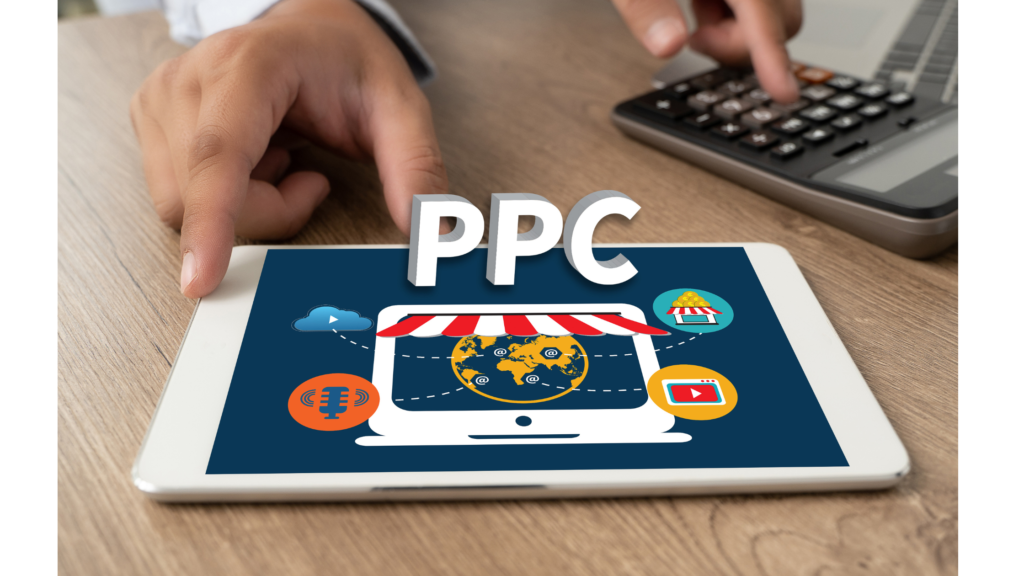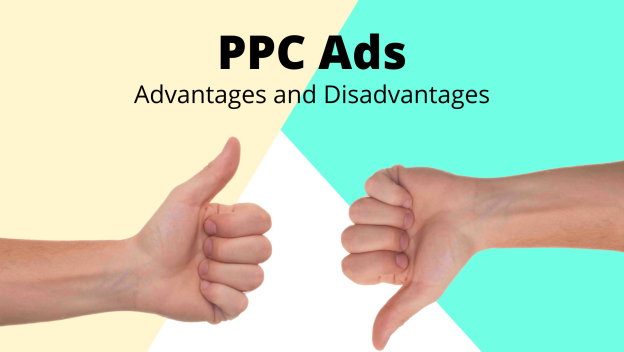Are you considering investing in Pay-Per-Click (PPC) advertising? As businesses compete for the attention of online audiences, PPC advertising has become an increasingly popular way to drive traffic and generate leads. By bidding on relevant keywords, you can place your ad at the top of search engine results pages and attract potential customers to your website. But is PPC advertising really worth the investment? In this article, we’ll examine the advantages and disadvantages of PPC, providing you with the insights and statistics you need to make an informed decision.
Related: 8 Best PPC Practices for the Holiday Season
Before, we jump into advantages and disadvantages of PPC, it’s important to understand what are PPC ads and why businesses use PPC ads?
What Are PPC Ads?
PPC (Pay-Per-Click) ads are a type of online advertising in which businesses bid on specific keywords or phrases to display their ads on search engine results pages (SERPs) and other websites. Each time a user clicks on their ad, the business pays a fee to the platform where the ad is displayed. PPC ads are typically used to drive traffic to a website, generate leads, and increase conversions. They offer businesses the opportunity to target specific audiences based on their interests and search behavior, making them a powerful tool for reaching potential customers. However, while PPC ads can offer significant benefits, they also come with some potential drawbacks that businesses need to consider before investing in them.
Why Businesses Use PPC Ads?
Businesses use PPC ads for a variety of reasons, primarily to attract potential customers to their website and generate leads. PPC ads offer several advantages over traditional advertising, including the ability to target specific audiences based on their search behavior and interests, the ability to track results and measure return on investment (ROI), and the flexibility to adjust campaigns in real-time.
In fact, according to a recent study, businesses make an average of $2 in revenue for every $1 they spend on Google Ads (formerly known as Google AdWords), demonstrating the potential for significant ROI with PPC advertising. Additionally, PPC ads can be particularly effective for small businesses and startups that may not have the resources to compete with larger brands in traditional advertising channels. However, it’s important to note that businesses need to carefully manage their PPC campaigns to avoid potential pitfalls such as click fraud and overspending on ineffective ads.
Now, let’s discuss the advantages and disadvantages of PPC ad campaigns.

Advantages of PPC Ads
- Cost-effective
- Trouble-free performance tracking
- Quick results
- Provides complete control over your ad campaign
- Spectacular targeting options
- Performs well with other marketing platforms
1. Cost-Effective:
PPC ads are good value for money since you only pay when a lead reaches your website or clicks your ad. Unlike most advertising methods that burn a hole in your pocket due to large, upfront fees, PPC marketing does not have any fixed fees.
Moreover, most search engines do not have an account set up fees. You can efficiently manage your budget by spending according to your needs.
Whether you’re a global conglomerate or a family-owned business in a small town, you can easily control your ad budget to meet your financial limits. Thus, you could start your PPC account with a budget of as low as $500 and increase your ad spend over time.
2. Trouble-Free Performance Tracking
You can effectively manage your lead generation and ROI goals using PPC advertising. Other digital marketing techniques like Search Engine Optimization (SEO) have a complicated tracking method. However, this is not the case with PPC as you can use Google Ads to your advantage.
Google Ads allows you to easily track your keywords, conversion rates, Click-Through-Rates (CTR), determine which ads performed better and which ads were seen by potential customers. Your ad tracking can be further enhanced by the incorporation of Google Analytics with Google Ads.
Google Analytics provides in-depth, customized reports based on your business goals, for instance, Audience, behavior, conversions to name a few. These stats are a great indicator of your campaign performance.
You may effortlessly measure your traffic and user actions on your website among many other things. PPC has clear attribution of budget to direct results, unlike most other digital marketing methods.

3. Quick Results:
Time is money in the business world. This means that you should be able to generate your campaign results instantly. With PPC campaigns, you can notice an increase in your website traffic in just a few days.
This is because your ads are placed on top of search engines like Google and users click on them if they have found a solution to their search query.
Conversely, an organic SEO technique can take you months to see a difference in results. Additionally, if you have your ad creatives and landing pages ready, PPC advertising can be deployed instantly since you are not required to sign a contract.
4. Provides Complete Control Over Your Ad Campaign:
These campaigns are adjustable since you’re in complete control. Not only can you advertise more effectively but can also adjust placements or keywords according to your target audience and the latest market trends. Moreover, you can be as restrictive as you want in terms of your ad placement, target audience, and budget.
You have bid flexibility as you decide how much you’re willing to spend on a keyword. Although it is recommended to bid close to the market rate to stay relevant. Furthermore, you have ultimate control if you want to pause your ad spend right away. Other ongoing campaigns do not provide this level of flexibility.
The Google Ads’ algorithm and its auction system have given advertisers the power to strategically position their ads and manage ad spend.
The world around you is constantly changing. Shouldn’t your ads too? With PPC marketing, you can instantly optimize and edit your in-progress ads while trying various new tests every day. Pay special attention to your ad copy and the alignment of your keywords and landing pages since it can make or break your ad campaign.
5. Spectacular Targeting Options:
Choose your target audience based on demographics such as language, location, devices, to name a few. Adopting a multi-layered approach in Google Ads will ensure successful targeting and enhanced brand exposure.
It could include targeting relevant keywords through text ads, remarketing campaigns based on past behavior, or using display ads.
By testing a new marketing mix, you can leverage Google Ads to gain many impressions while targeting your prospective audience. In addition, PPC’s incredible targeting allows you to reach users who are not exposed to your brand along with those who aren’t your regular customers.
6. Performs Well with Other Marketing Platforms:
Most businesses now incorporate content marketing into their digital marketing strategy. Content marketing and PPC can be merged effectively to boost lead generation and sales.
Unique and targeted content will rank high as per Google Ads’ algorithm, thus driving visitors and increasing your return-on-investment (ROI). Similarly, a good SEO strategy and PPC can help you perform well in the long-run.
Google Ads provides in-depth data on keywords therefore you can strategically prioritize your SEO efforts. Similarly, Google’s remarketing campaign is a great tool for re-targeting leads, and for increasing user engagement.
Disadvantages of PPC Advertising:
- Steep learning curve
- Market saturation
- Your costs can pile up fast
1. Steep Learning Curve:
Designing and launching a successful pay-per-click campaign requires experience and a certain level of knowledge. No one wants to invest thousands of dollars only for a campaign to be unsuccessful.
Many businesses choose a specialist digital marketing agency since managing a PPC campaign is not a pick-up and play affair.
An advertiser must have an advanced literacy level of PPC metrics to run an effective marketing strategy. In contrast to other digital marketing techniques, PPC has the steepest learning curve. Additionally, it also requires significant dedication even for marginal proficiency.
2. Market Saturation:
Search Engine Optimization (SEO) spendings have increased over the years, resulting in inflation in Google Ads bidding and cost-per-click (CPC). Moreover, the competition will only grow steeper in the coming years.
Therefore, to avoid overspending on these ad campaigns, you must focus on your business, industry, and your budget. Further, preparing an ad budget will aid you in deciding if running a Google Ads Campaign is worth it for your business or not.
3. Your Costs Can Pile Up Fast:
You could be throwing your money down the drain if you do not regularly monitor or optimize your ad campaigns for ROI. PPC advertising requires budget allocation as opposed to SEO that only needs skills and time.
Your advertising agency could be paying for unprofitable keywords without realizing the fact that you have to pay for every click even if users don’t purchase.
Thus, you must hire professionals that will guarantee the most profitability without putting a dent in your wallet.
Now that you have learned the advantages and disadvantages of PPC ads, it’s important to understand how you can run an effective PPC ad campaign. Below, we have shared some tips.
Tips For Effective PPC Advertising
While PPC advertising can be a powerful tool for businesses, success depends on using the right practices. Here are some tips for effective PPC advertising:
- Research and choose relevant keywords: Conduct keyword research to find the most relevant and effective keywords for your business. Use tools like Google Keyword Planner or SEMrush to help you identify high-volume, low-competition keywords that will attract potential customers.
- Create compelling ad copy: Your ad copy needs to be engaging and persuasive to attract clicks and convert visitors into customers. Use attention-grabbing headlines, clear and concise language, and a strong call-to-action.
- Test and adjust campaigns regularly: Testing different ad variations, landing pages, and targeting options can help you optimize your campaigns and improve ROI. Use A/B testing to compare different elements of your ads and make data-driven decisions.
- Monitor and manage your budget carefully: Set a budget that aligns with your business goals and monitor your campaigns regularly to ensure you’re getting the most value for your spend. Use analytics tools like Google Analytics to track your progress and adjust your budget and targeting as needed.
Above, we have discussed advantages and disadvantages of PPC and also some tips to help you create more effective PPC campaigns that drive traffic, generate leads, and increase conversions.
Final Verdict:
As stated above, PPC ads benefits outweigh its downsides and as an entrepreneur or a business owner, you should incorporate it in your marketing strategy. However, if you want to get the most out of your campaign on a budget, you should hire professionals.
A professional advertiser can effectively design, manage, and launch your PPC campaigns while guaranteeing ROI. AdRush is a full-service digital marketing agency that provides Social Media Marketing, Email Marketing, Content Marketing, Search Engine Marketing, Search Engine Optimization (SEO), and Performance Marketing.
If you need assistance in your PPC campaign, schedule a FREE Consultation today.


